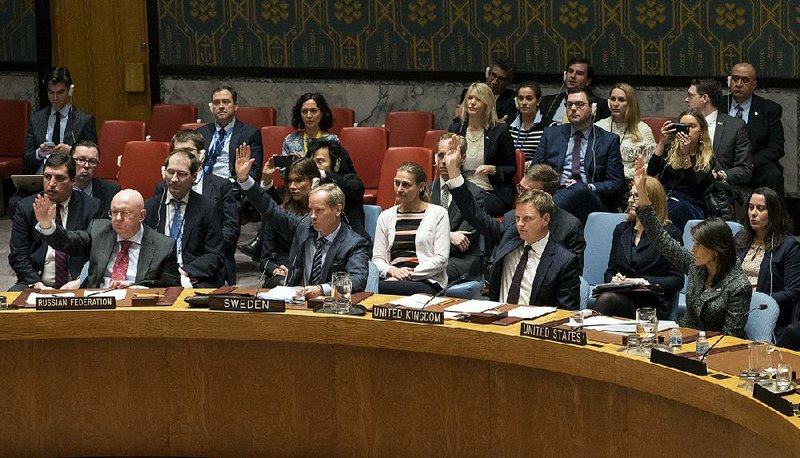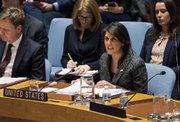BEIRUT -- The U.N. Security Council on Saturday unanimously approved a resolution demanding a 30-day cease-fire across Syria as a new wave of airstrikes and shelling on eastern suburbs of Damascus left at least 22 people dead and dozens wounded, raising the death toll of a week of bombing in the area to more than 500.
The weeklong bombardment has overwhelmed rescuers and doctors at makeshift hospitals, many of which also have been bombed. Activists say terrified residents have been hiding in underground shelters where dozens of people often are crammed into small places.
The U.N. resolution came after intense negotiations to persuade Russia not to use its veto power in the Security Council. Moscow had blocked 11 previous Syria resolutions. The United States and others accused Moscow of protecting Syrian President Bashar Assad's government and its bombing campaign in the eastern Ghouta suburbs of the capital, Damascus, while allowing a humanitarian disaster to continue.
There was a further delay Saturday as Russia and the United States haggled privately over the final text. Cameras in the Security Council chamber captured other delegates poring over the document shortly before the session finally began, more than two hours behind schedule.
[THE ISLAMIC STATE: Timeline of group’s rise, fall; details on campaign to fight it]
Nikki Haley, the U.S. ambassador to the U.N., said little had changed during the arduous negotiations, "except a few words and some commas." She blamed Russia, Syria and Iran for not taking moral responsibility for the urgency of the situation.
"As they dragged out the negotiation, the bombs from Assad's fighter jets continued to fall," she said. "In the three days it took us to adopt this resolution, how many mothers lost their kids to the bombing and shelling? How many more images did we need to see of fathers holding their dead children?
"All for nothing, because here we are voting for a cease-fire that could have saved lives days ago."
Russia's U.N. Ambassador Vassily Nebenzia repeatedly had called an immediate cease-fire unrealistic.
In a bid to get Russian support, sponsors Kuwait and Sweden amended the draft resolution late Friday to drop a demand that the cease-fire take effect 72 hours after the resolution's adoption.
"The U.N. convoys and evacuation teams are ready to go," Sweden's U.N. Ambassador Olof Skoog told the council just before the vote.
After the vote, many council members urged stepped-up efforts to ensure a cease-fire and get assistance to millions in need.
"This ended up being a bit of a showdown," between Haley and Nebenzia, said a Security Council diplomat who requested anonymity to describe the private negotiations.
"She succeeded in retaining vital language in the resolution that called for an immediate start to the cease-fire and unfettered humanitarian access without delay. The Russians kept trying to water it down."
President Donald Trump accused the Syrian government and its backers, Russia and Iran, of being responsible for a humanitarian "disgrace."
French President Emmanuel Macron and German Chancellor Angela Merkel appealed in a joint letter to Russian President Vladimir Putin to back a cease-fire.
Haley supported the cease-fire idea and, in remarks Thursday, criticized Russia for "trying to give cover" to its ally Assad.
She said U.S. military strikes like those Trump ordered a year ago are "always going to be on the table," and said Russia had walked away from its previous cooperation in the removal of chemical weapons from Syria.
"Russia has covered for Assad many times we now have to decide what's the response to that," Haley said during a question-and-answer session at the University of Chicago's Institute of Politics.
"Assad very much knows that we will act if we see proof that they have done this, and they are walking a very fine line," Haley said.
Russia has been a main backer of Assad since the country's conflict began seven years ago. In 2015, Moscow joined the war on Assad's side, tipping the balance of power in his favor.
Syrian opposition activists say Russian warplanes are taking part in bombarding eastern Ghouta, where many people are hiding in underground shelters with little food and medical supplies under a tight government siege.
"There is no electricity, no water, no flour, no bread and no baby formula," said paramedic Siraj Mahmoud in an audio message calling for a short break in airstrikes so people can get food for their children. "There is nothing inside Ghouta."
Syrian opposition activists said that government forces used phosphorus bombs in their attacks on the suburbs, but the claims could not be independently confirmed.
The Britain-based Syrian Observatory for Human Rights said airstrikes that hit several suburbs left 22 people dead in different areas, including 10 in the suburb of Douma.
The opposition's Syrian Civil Defense, also known as the White Helmets, said 23 people were killed.
The Observatory said that since the latest wave of bombardment began last Sunday, 510 civilians, including 127 children and 75 women, have been killed in eastern Ghouta.
The White Helmets said it has documented the names of 420 people who have been killed since last Sunday, adding that dozens more have still not been identified.
Syrian state media outlets reported that rebels fired mortar shells on Damascus, Assad's seat of power, killing at least one person and wounding seven.
Information for this article was contributed by Bassem Mroue and Edith M. Lederer of The Associated Press; and by Carol Morello and Anne Gearan of The Washington Post.
A Section on 02/25/2018


